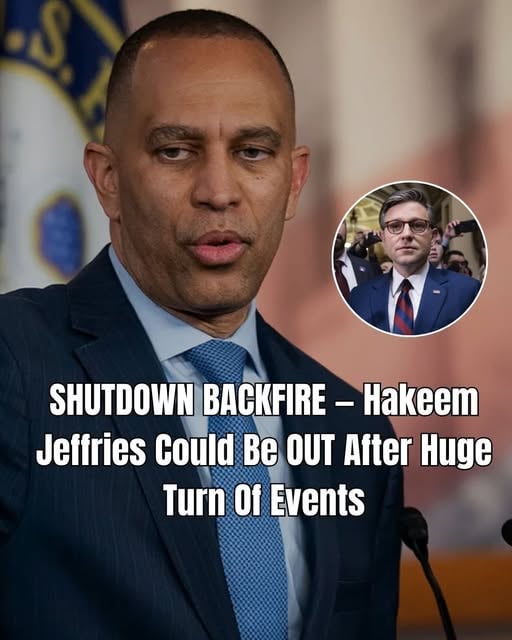In a sign of rising division within the Democratic Party, dozens of Democratic candidates running for U.S. House seats across the country say they are unwilling — or not yet ready — to commit to supporting House Minority Leader Hakeem Jeffries (D-N.Y.) for party leader.
According to a recent report from Axios, 113 Democratic candidates considered competitive in the 2026 election cycle were asked whether they would back Jeffries. The results reveal growing uncertainty about the party’s direction and the challenges its leadership may face ahead of next year’s high-stakes races.
A Crack in the Unity
Since succeeding former Speaker Nancy Pelosi in 2022, Jeffries has been widely seen as a unifying figure, maintaining near-unanimous support within the House Democratic caucus. But the new survey suggests that harmony could be tested as the next Congress approaches — particularly as progressive voices push for a more confrontational stance against Republicans and a stronger commitment to left-leaning priorities.
Of the candidates surveyed by Axios:
- 20 said outright they would not vote for Jeffries as party leader or speaker.
- 5 more indicated they were likely to oppose him.
- 57 declined to commit, calling it too early to decide or expressing concerns about the party’s messaging and direction.
- Only 24 candidates said they would definitely support him, while seven said they were likely to do so.
The numbers reveal a noticeable fracture among the next generation of Democratic hopefuls — especially those aligning with the progressive wing of the party.
Growing Frustration on the Left
While Senate Minority Leader Chuck Schumer has often been a focal point of progressive criticism, Jeffries is increasingly facing similar pushback from younger and more activist-aligned Democrats. Many argue that the party’s current leadership has failed to show enough urgency in confronting conservative policies or advancing bold reforms.
Some candidates told Axios that their hesitation isn’t about Jeffries personally but about what he represents — a continuation of establishment politics.
Heath Howard, a state representative from New Hampshire running for Congress, put it bluntly: “We need leadership that’s ready to fight back much harder against the Trump administration and what it stands for.”
Kat Abughazaleh, running in Illinois to replace retiring Rep. Jan Schakowsky, said she would support a leader who is “taking real action” against Republican policies and using the left’s influence “to demand progressive change.”
Amanda Edwards, a former Houston city council member now running for Congress, told the outlet, “We’ve got to see improvement, without question.”
Key Candidates Keeping Their Distance
Among the better-known names who have declined to commit to supporting Jeffries are Daniel Biss, Kat Abughazaleh, Luke Bronin, Donavan McKinney, Mai Vang, Saikat Chakrabarti, and Patrick Roath — all of whom are running strong campaigns, many aimed at unseating long-time Democratic incumbents.
Harry Jarin, a firefighter challenging former House Majority Leader Steny Hoyer (D-Md.), said, “The anger of the base right now is not being matched by Democratic leadership, and that’s going to have to change one way or another.”
Another source of discontent stems from Jeffries’ decision not to endorse socialist New York City mayoral candidate Zohran Mamdani, a favorite among progressive activists. Several candidates cited that refusal as evidence of what they view as a disconnect between the party’s leadership and its more activist base.
Jacob Lawrence, a candidate challenging Republican Rep. Chuck Edwards in North Carolina, said Jeffries’ lack of support for Mamdani “makes me nervous that, if I were to become the nominee in my race, he and the party would not support me.”
Meanwhile, Chakrabarti — known for his work alongside Rep. Alexandria Ocasio-Cortez and the Justice Democrats — responded to a question about Jeffries’ leadership with a hint of irony: “What did Hakeem say about endorsing Zohran? ‘We’ll have conversations and see where it goes’ — well, that’s my answer too.”
Jeffries’ Office Pushes Back
Despite the criticism, Jeffries’ team dismissed suggestions that the Democratic leader has lost support.
“Leader Jeffries is focused on battling Donald Trump, ending the Republican shutdown of the federal government, and addressing the GOP’s healthcare crisis,” spokesperson Justin Chermol said in a statement to Axios.
Chermol emphasized that Jeffries remains committed to leading the caucus through unity and discipline — a strategy that has earned him praise for keeping Democrats cohesive in recent votes, even amid deep ideological differences.
What It Means for 2026
While many of the candidates critical of Jeffries are first-time or long-shot contenders, Axios notes that some have credible chances of winning seats — especially in open districts or in primary challenges against establishment Democrats.
The findings highlight a growing generational divide within the party, as younger Democrats and progressives seek bolder leadership while moderates prioritize unity and electability.
For now, Jeffries remains firmly in control of his caucus. But if Democrats make significant gains in 2026, the influx of new members — particularly from the party’s activist base — could reshape the internal dynamics of House leadership in ways not seen since the rise of the progressive movement after 2018.
As one campaign strategist told Axios, “The real question isn’t whether Jeffries keeps his title — it’s whether the Democratic Party is ready to evolve with the voters it claims to represent.”



